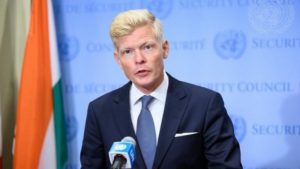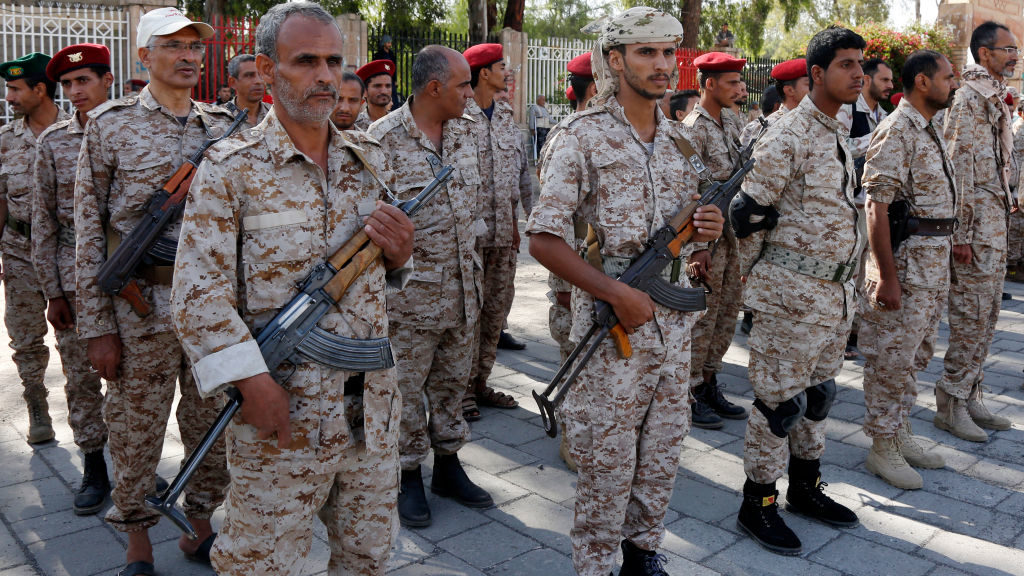As Truce in Yemen Expires, Conflict Likely To Return
The failure to renew the UN-brokered truce is partly attributed to cracks in the Saudi-backed government, which make Houthis feel they are in a stronger position
The truce in Yemen has not been renewed after no agreement could be reached between the parties before it expired, Hans Grundberg, the United Nations special envoy for Yemen, announced.

UN Special Envoy for Yemen Hans Grundberg. (Screenshot: Twitter)
“The UN special envoy regrets that an agreement has not been reached today, as an extended and expanded truce would provide additional critical benefits to the population,” Grundberg’s office said in a statement on Sunday.
“I appreciate the position of the government of Yemen on engaging positively with my proposal. I will continue to work with both sides to try and find solutions,” Grundberg said.
The truce first came into effect on April 2 and brought the longest period of tranquility since the civil war in Yemen started in 2014. According to the UN, the truce has decreased casualties by 60% in the country, quadrupled the amount of fuel entering Yemen through the Hodeidah port, and helped to return the proper functioning of public services including a compelling improvement in Yemenis’ access to medical care.
However, after three successful renewals of the UN-brokered truce, this time the sides failed to come to an agreement, bringing the truce to an end with its expiration on Sunday.
One of the factors that changed the situation and negatively affected the negotiations is that the perception of the balance of power between the sides has changed, according to Elisabeth Kendall, a Middle East expert and mistress of Girton College at Cambridge University.
The Houthis likely feel that they are now in a stronger position, Kendall told The Media Line, “since cracks have appeared in the new Presidential Leadership Council (PLC) which was intended to present a robust anti-Houthi alliance.”
The PLC is also known as the Saudi-backed government in the current conflict.
Hannah Porter, an independent consultant on Yemen affairs, said that, in addition to the change of the Houthis’ view on the PLC, the Houthis had warned that they would not renew the truce unless significant changes take effect.
She told The Media Line that this includes the payment of salaries and pensions of public servants in the areas under Houthi control, increased flights to and from Sanaa, and allowing more fuel shipments to enter their territory.
“They feel that these terms have not been met, so it is no longer advantageous for them to maintain a truce,” she said.
Nonetheless, Kendall stressed that these are concessions that will be extremely difficult to meet at present, particularly in the absence of any structured peace dialogue.
“The impression is that the Houthis are not genuinely interested in continuing the truce,” she said, adding that the Saudi-backed government already has made significant concessions concerning the entrance of fuel ships to the Hodeidah port, and the opening of Sanaa airport to some international commercial flights.
These arrangements are not perfect, she noted, “but there are substantial concessions. Meanwhile, the Houthis have failed to agree to successive proposals by the UN to open roads around the besieged city of Taiz.”
The rhetoric from the Houthis shows that they are ready to resume fighting within Yemen and there are already reports of fighting breaking out along some front lines
Porter believes that conflict will be restored. “The rhetoric from the Houthis shows that they are ready to resume fighting within Yemen and there are already reports of fighting breaking out along some front lines,” she said, citing the Twitter account associated with Yahya Saree, the Houthi military spokesman, in which he already has posted threats to attack oil companies in Saudi Arabia and the United Arab Emirates.
“The armed forces give the oil companies operating in the UAE and Saudi Arabia an opportunity to arrange their status and leave, as long as the countries of the American-Saudi aggression are not committed to a truce that gives the Yemeni people the right to benefit from their oil wealth for the benefit of the salary of Yemeni state employees. And you have been warned,” he tweeted.
While Kendall believes that a form of the truce can still be brokered beyond the deadline, she says that it is unlikely to be the expanded truce that the UN special envoy was seeking and that a more likely scenario is that Yemen returns to conflict.
The last six months have given Yemenis the longest period of relative peace since the war began, she said, adding that it will be devastating for them to see a return to war, especially at a time when inflation, unstable supply chains, and dwindling international aid are exacerbating the humanitarian crisis. “A bad situation could quickly become catastrophic,” she warned.


